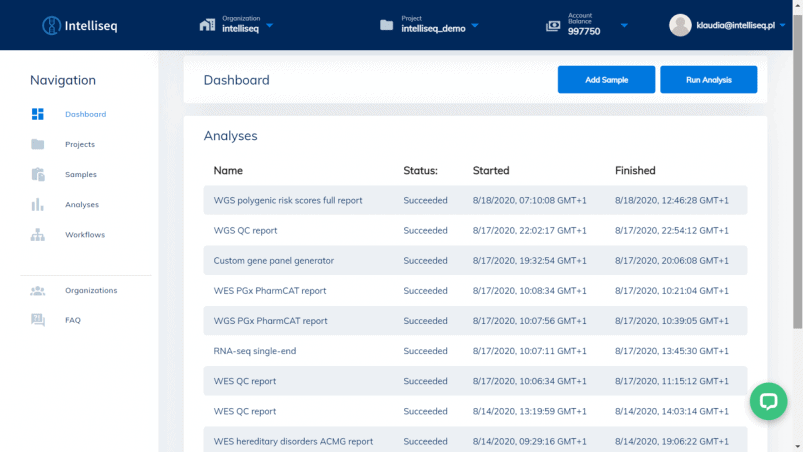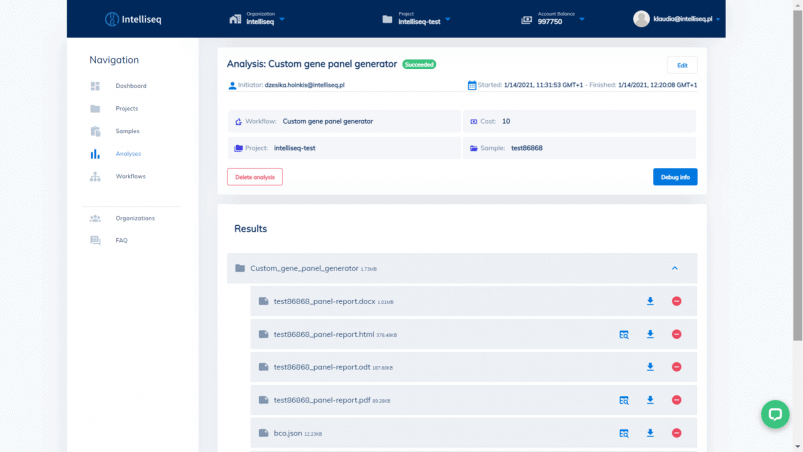
Intelliseq provides state-of-the-art bioinformatics solutions for next-generation DNA sequencing. In this interview, Business Development Director Klaudia Szklarczyk-Smolana discusses the capabilities that Intelliseq brings into the lab and the various applications it can be utilized for.
Please describe the story behind the company: What sparked the idea, and how has it evolved so far?
Intelliseq was established back in 2014 by a group of scientists fascinated with genomics. The founders are interdisciplinary scientists and experts not only in bioinformatics, which is our core activity but also in molecular biology, genetics, mathematics, and software development.
Intelliseq’s mission is to make genome-based medicine practical by providing software solutions for genetic data analysis. We understand that in-depth data analysis and interpretation lies at the very heart of successful genome-wide research. We are launching an automatic genome interpretation system (software as a service platform for next-generation genome sequencing, NGS, data analysis) that generates clinical reports and easily integrates with laboratory information systems.
What can you tell us about your new IntelliseqFlow Platform?
IntelliseqFlow is a SaaS platform for human genome analysis in different areas of genome-based medicine. Our primary focus is on the clinical field and the identification of genetic variants that contribute to particular genetic diseases. However, the platform users can also run analyses in different fields of interest, including polygenic risk scores that indicate individual’s predispositions for wellness- and/or health-related traits. A growing number of individuals seek to know more about their genetic predispositions of traits related to nutrition, metabolism, and fitness. You can find all of that on our platform.
IntelliseqFlow also offers workflows for pharmacogenomics, which means identifying genetic variants that impact your drug metabolism. Based on the found variants, it is possible to classify an individual as a fast or slow metabolizer of a particular drug and to adjust the dosing much more accurately. Genetic makeup-based prescriptions can improve the effectiveness of therapy.
Here’s a view of the IntelliseqFlow Dashboard:


What kind of customers do you work with?
Our sales model is B2B. We offer the platform to molecular diagnostic laboratories, scientific institutes, and research centers that conduct studies in genetics. By offering our software, we’re actually partnering with them in providing their customers with clinical insights based on their genetics. Depending on the analysis selected, IntelliseqFlow may transfer raw DNA reads into reports with ACMG recommendations on variants pathogenicity (dedicated to genetic counselors and doctors) or into user-friendly reports with polygenic risk scores dedicated directly to customers, including healthy individuals.
What are the current challenges that lab teams struggle with, and how does your solution help?
The process of human genome analysis can be the slowest, most expensive, and labor-intensive one among all the processes around DNA: sequencing, analysis, and interpretation. In many labs, there are few experts in this field, no proper IT tools, or difficulties in transferring scientific knowledge into clinical practice. Moreover, external bioinformatic solutions are often paid in advance.
On the other hand, software that is not expensive provides only a preliminary analysis, so eventually, a lab would still need to have a bioinformatician onboard.
We aim to help labs analyze genetic data in a fast, simple, and secure manner. In just three simple steps, users can run the analysis they selected and get a report that includes all the variants that may be pathogenic, and may point to a specific disease.
IntelliseqFlow main features are:
- Automation and scalability: one platform, any NGS analysis;
- Comprehensiveness: raw sequence to clinical insight reports;
- Bioinformaticianless: user-friendly interface that is easy to operate;
- Cost-effectiveness: no upfront cost and a fixed price per analysis;
- Security and regulatory compliance: ISO:13485, HIPAA.
What are some typical use cases for Intelliseq?
Imagine a person who is suffering from a number of symptoms that are hard to diagnose. They go through the so-called diagnostic odyssey. They move from clinician to clinician, experiencing multiple misdiagnosis and incorrect treatment. That means even more suffering for such a patient, who can’t get the answer to their question, what am I suffering from?
By sequencing the whole genome and running the analysis on our software, a doctor or/and a genetic counselor can answer such questions. In the report, they receive information about the pathogenic variants found in the patient’s DNA as well as the associated diseases. One of the advantages of our platform is that it enables the users to verify different hypotheses on the diagnosis by entering single genes or gene panels before running the analysis. Moreover, the analysis can be performed even after entering the patients’ symptoms (phenotype) without gene names as inputs. Our software will automatically check and report genetic variants that may contribute to the phenotype described by the user.
As I mentioned previously, IntelliseqFlow also generates direct-to-consumer reports about genetic risk for health and wellness-related traits. Such reports can be interesting for consumers without any symptoms, who want to learn more about their predispositions for polygenic traits from different areas, eg. metabolism, nutrition, sports, life longevity.
Based on genome-wide association studies from highly impactful scientific journals, we’ve implemented polygenic risk scores (PRS) as a method to calculate an individual’s risk and classify it as “high”, “moderate”, or “low”. We also include the “Science behind the test” part, in which the user can learn about the percent of heritability that the score accounts for. Additionally, each PRS report contains personalized recommendations based on the score, including lifestyle and diet changes.
All in all, IntelliseqFlow delivers a comprehensive solution for labs that supports patients and healthy individuals in a variety of genome-based decisions according to diagnostics, treatment, and prevention.
How do you source the data that you rely on?
The results-related content in the IntelliseqFlow reports is curated from the trusted sources, including databases like gnomAD, 1000 Genomes, Grch38.p2, HGMD, ClinVar, HPO, OMIM. Moreover, we follow the guidelines of highly recognizable authorities in the field, for example, the American College of Medical Genetics recommendations for variant pathogenicity and Clinical Pharmacogenetics Implementation Consortium prescribing recommendations for pharmacogenetic testing. Our reports contain only up-to-date clinical insights because the knowledge databases that we rely on are constantly updating as new more genetic variants and their functions are being discovered.
How do you envision the future of your industry?
The decreasing cost of DNA sequencing and the importance of genomic data lead to the fact that more human genomes are being sequenced. We think that genome-based medicine will move towards a repeated, on-demand analysis of genetic information throughout life. This entails new challenges for genome data storage and security.
Once sequenced, the genome could be subjected to multiple analyses and interpretations in the field of diagnostics, therapy, and prevention. One of the major emerging trends in the field is pharmacogenomics. The implementation of pharmacogenomic testing into clinical practice will significantly improve drug safety and enable a more efficient therapy.
Another trend is the use of PRSs for risk assessment of polygenic traits. Knowledge of an individual’s PRS can have a huge potential for broad-scale clinical use. In the future, it could be combined with traditional risk factor analysis to predict the risk even better than the classical methods. Many health-related conditions involve environmental and lifestyle factors as well as genetic susceptibility, therefore, combining PRSs with other known risk factors will further improve risk prediction and help define clinical action thresholds.
Moreover, the sequencing technology itself is evolving. Currently, we are approaching the so-called third-generation sequencing or long-read sequencing technology. This will be a game-changer for companies like ours that are focusing on data analysis and will have to adjust their analytical tools. The new technology revolutionizes genomics because it will reveal the full spectrum of human genome variation and help to discover novel mechanisms of diseases.
How can readers join the IntelliseqFlow platform?
Readers can sign up for early access to IntelliseqFlow via our website: www.intelliseq.com. Currently, we are offering free pilot studies for the first users. Especially, diagnostic laboratories and research centers interested in entering or scaling up the genome-based medicine market are invited for cooperation!

